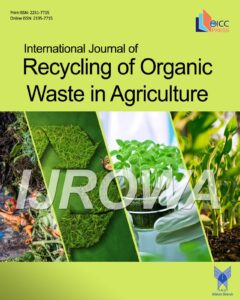Remediation of degraded soils with hydrogels from domestic animal wastes
Authors
Abstract
Introduction This study reports on water management in the fields found in arid areas by the improvement of the soil’s water retention capacity. This was done using hydrogels from animal wastes to mitigate the effects of climate change that lead to rapid evaporation of water hence increased desertification rates.
Method The modification of the cow dung to hydrogels involves the oxidation of urea or uric acid from chicken dung to form compounds that can undergo a condensation reaction with cellulose in the cow dung. This formed a product with high water retention capacity.
Results The materials were characterized using Fourier transform infra-red spectroscopy and thermo-gravimetric analysis which confirmed the derivatization of some functional groups. The thermo-stability was improved, as the degradation temperatures for urea, glycerol, and chicken dung derivatives were 245, 220, and 228 °C, respectively, while the unmodified form was 198 °C. The UV–Vis analysis showed no evidence of starch in the modified material which was also confirmed by Lugol’s test. It was found out that modification had influence on the swelling ability giving it superabsorbent properties with swelling capacities (300 g g−1) within 5 min of moisture exposure plus a high water retention capacity of 90%.
Conclusions The application of the modified materials in the growing of some selected plants showed that the moisture content could be sustained for a period of 6 weeks before the plants wilted. This confirms that the modified form of manure has potential application for hydration of plants in arid areas.



